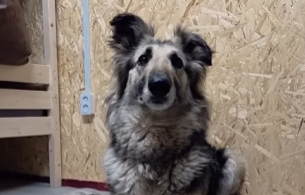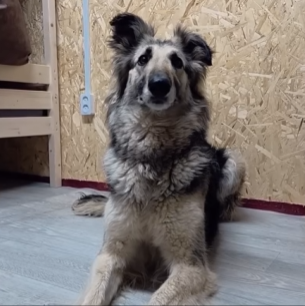
The question came quietly, trembling like a leaf in cold wind. The little girl’s voice was barely louder than a whisper, yet somehow it carried the weight of a broken world. She stood in front of me with her small hands clenched, her lower lip trembling, her eyes—too big, too hopeful—fixed on mine.
“Dad will come back… won’t he?”
I froze.
Behind her, the shelter’s hallway hummed with quiet activity—volunteers walking, dogs barking softly, sunlight drifting through dusty windows. But around us, time stalled. The child in front of me was only nine years old, yet she held sadness that belonged to someone much older.
Her name was Lila.
And the dog she was asking about—her father’s dog—was Max.
Max was a golden retriever with a gentle soul, but he looked nothing like the happy family dog he once had been. When they brought him in earlier that morning, he was exhausted, his fur matted, his ribs visible, his eyes tired. He had been found wandering alone near the highway, limping, dehydrated, and confused.
And the reason he had been wandering…
The reason he came to us…
Was because Lila’s father had left.
A factory layoff. A pile of debts. Pressure that crushed him from all sides.
And one morning, without saying goodbye, he was gone.
People said he abandoned the dog to save money. Some said he was ashamed. Some said he planned to come back. No one knew the truth.
But Lila believed one thing with her entire heart:
Her dad would return.
And if he did, he would return for Max.
That was why she clung to the question as if it were her only lifeline.
“Dad will come back, won’t he?”
I opened my mouth—but no answer came.
Because what can you say to a child whose heart is splintering but still trying to believe?
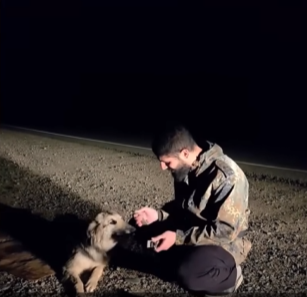
**
It had been two hours since Max arrived. He lay curled in the back of the kennel, head resting on his paws, eyes half-closed. When he heard Lila’s voice earlier, he lifted his head—just slightly—then lowered it again as if each movement cost him something.
He missed his owner. That much was clear.
But what Max missed even more was the little girl kneeling outside the kennel now.
Lila slipped her hand through the bars, her fingertips brushing the cold metal.
“Max…” she whispered.
The dog turned his eyes toward her, and that one small motion broke her. Tears welled instantly in her eyes, but she blinked them back with determination.
“I’m here,” she told him. “I’m not leaving you.”
Max slowly lifted his head, sniffing toward her trembling fingers. Then, with effort, he crawled the last few inches and pressed his nose gently into her hand.
Lila let out a small sound—a mix of relief and heartbreak.
When she turned to look at me again, her voice cracked.
“He misses Dad,” she said. “He’s waiting for him… I know he is.”
I nodded softly. “He misses him very much.”
Her eyes glistened. “So Dad will come back… right?”
The question returned, sharper than before.
Hope is fragile. But when it belongs to a child, it becomes something fierce—something that refuses to die even when the world keeps striking it down.
I knelt beside her.
“What did your dad tell you before he left?” I asked gently.
She wiped her cheeks. “He said he was going to fix things. He said everything was going to get better.”
“Do you believe him?” I asked.
Her voice shook. “I want to.”
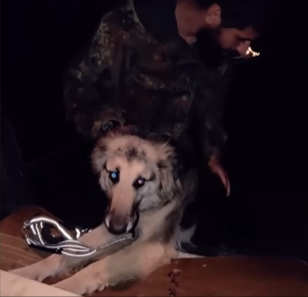
**
For a long moment, we sat there—her hand on Max’s fur, my hand resting lightly on her back, the silence filled with unspoken fears.
The truth, as far as we knew, was devastating: her father had left without a word. A neighbor found the dog alone. No one had been able to reach him. And in cases like this, the statistics were cruel.
People didn’t always come back.
But children… they shouldn’t have to hear that.
They deserved gentler truths—truths that didn’t crush their tiny hearts.
So I gave her something honest, yet kinder than the cold reality.
“I don’t know when he’ll come back,” I said carefully. “But I do know this—Max isn’t alone. And you’re not alone either.”
Her brows knit together. She shook her head.
“But Dad… he loves Max. He loves me. He wouldn’t just go. He wouldn’t…”
Her breath choked off. She buried her face against Max’s neck, her small body shaking as silent tears spilled over her cheeks.
I felt my heart split right down the middle.
Max, sensing her pain, raised his head fully for the first time all day. He nudged her face gently, whining softly. His tail gave one slow, tired thump.
Even heartbroken and weak, he was trying to comfort her.
Lila’s shoulders relaxed slightly. Her crying softened. She wrapped her arms around Max’s neck, burying herself in the one piece of her old life she still had.
When she finally looked back at me, her face was streaked with tears, but her eyes—those eyes—still held hope.
“Can I stay with him?” she asked. “Until Dad comes back?”
“You can stay as long as you want,” I said warmly.
**
She visited every day after school.
Some days she talked to Max about her classes, her drawings, her favorite songs. Some days she sat quietly beside him, resting her head on his side. Little by little, Max gained strength. His fur softened with proper care. His body filled out. His eyes brightened whenever she entered the room.
But the person they were both waiting for did not return.
The days turned into weeks.
The weeks turned into three long months.
One afternoon, after finishing her homework on the floor beside Max, Lila looked up at me and asked the question again—only this time, her voice didn’t shake.
“Do you think Dad’s coming back?”
I hesitated, the truth pressing heavily against my ribs.
She swallowed hard and answered her own question, her voice small but steady:
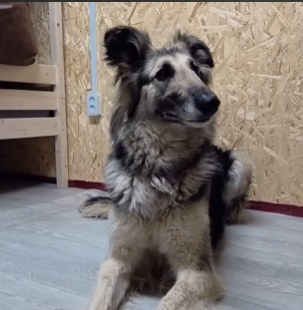
“I think… maybe he’s not.”
My breath caught.
It wasn’t the pain that struck me.
It was the quiet acceptance.
The kind that only appears after every last tear has already been shed.
She stroked Max’s head gently, her fingers sinking into the soft golden fur.
“But Max came back,” she whispered, smiling faintly. “And I’m here. So maybe… maybe that’s enough.”
Max licked her hand, and Lila giggled softly—truly softly—for the first time in months.
And then she said the words that stitched my broken heart back together:
“I want to take him home. Not to wait for Dad… but because Max needs me now.”
I felt warmth spread across my chest.
“I think,” I told her, “that Max has been waiting for you all along.”
**
Three weeks later, the adoption papers were signed.
When Lila walked out of the shelter, Max trotting beside her with a wagging tail and a new leash, the sunlight hit them like a blessing.
She held his leash proudly with both hands.
Max kept looking up at her, his eyes shining with trust.
As they stepped out into the world, I called after her gently:
“Lila?”
She turned.
“If your dad ever does come back… he’ll know where to find you. And he’ll see you’re not alone.”
She nodded, smiling a small, brave smile.
“I know,” she said. “But I’m not waiting anymore.”
Then she leaned down, kissed Max’s head, and whispered:
“We’re a family now.”
And Max wagged his tail as if he understood every word.
Whether her father would ever return remained a mystery.
But one thing was certain—
Lila wasn’t asking the question anymore.
She no longer needed someone to tell her “yes.”
Because she had built her own yes.
A new beginning.
A new bond.
A new home.
And Max—once abandoned, lost, starving and alone—walked proudly beside the girl whose hope had saved both their lives.
